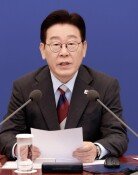Second Supplementary Budget of 3 Trillion Won
Second Supplementary Budget of 3 Trillion Won
Posted September. 22, 2003 22:51,
To recover the damage done by the typhoon `Maemi` on public facilities, the government is set to set up the second supplementary budget of three trillion won as early as next month.
Starting from this month, 500 billion won in reserved budget will be provided to help those hit by Maemi and recover damaged privately-owned facilities.
The government made public Monday the measure to recover the damages from the typhoon during the `the Second Economy and Public Livelihood Review Meeting` presided over by President Roh Moo-Hyun.
Under the proposed measure, the government will set up a supplementary budget considering the typhoon damage amounts to 4.8 trillion won. Although the exact size of the supplementary budget has not been set, the Ministry of Planning and Budget estimates that about three trillion won would be earmarked.
The Ministry will decide on the exact size of the supplementary budget by the end of this month and submit the proposal to the National Assembly with the approval of the interim cabinet meeting scheduled on October 2.
The upcoming supplementary budget will be spent on: assistance for the families of those dead or missing during the typhoon as well as low-income merchants and craftsmen; food assistance and living expense assistance for typhoon victims; recovery of housings, farm lands as well as childbirth and fish-raising facilities.
The Bank of Korea will lend 400 billion won for small companies hit by the typhoon at an interest rate of 3%. The current interest rate stands at 5%.
Merchants doing business at conventional markets could get government loans of 60 billion won originally set aside as the Small Business Promotion Fund at 3% interest rate which is lower than the current 5.9%.
During the meeting, President Roh instructed the participants to continuously check and evaluate the implementation of the government assistance programs so that they could produce substantial effects on the stabilization of the public livelihood and reduction of the unemployment rate among the young. He added, "Since the labor shortage at small companies is serious, not only the government but also the business circle, particularly small firms should actively ask for what they need to the education sector and create a social consensus on how to address the problem."
Jin-Hup Song Jeong-Hun Kim jinhup@donga.com jnghn@donga.com



![아침 공복 따뜻한 물 한 잔, 정말 살 빠지고 해독될까?[건강팩트체크]](https://dimg.donga.com/c/138/175/90/1/wps/NEWS/IMAGE/2026/03/05/133467930.3.jpg)



